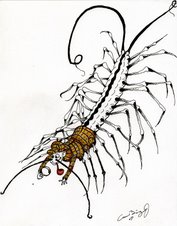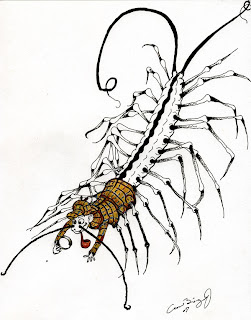"My special concern is for the reader of poetry: I cannot escape a feeling that the poets must face the responsibility of providing themselves with a wider audience...if such a reader could be enlightened on what the poets are trying to do, he might come a lot closer to understanding it when he sees it done."
-John Ciardi in a letter to Karl Shapiro. April 29th, 1949.
I know that in writing this I run the risk of flogging my own dead horse. I've been yammering for over a year now that when it comes to literature, we see many of the same themes resurface again and again, and if they happen to always be in a dialectic reaction, then I leave to the post-modernists--if there are any still alive--the task of telling me yet again why oppositions are arbitrary.
The reason I keep coming back to the thesis that these romantic and 'enlightenment' ideas are seen in the history of literature throughout the course of time, always embedded in, and perhaps responsible for, the furtherance of the hermeneutic spiral is that, in hermeneutic fashion, the thesis keeps coming up. The early 1900's present to careful readers a number of modern writers hell-bent on yapping about the state of society, emphasizing stylistic flourishes, and forcing a play in language. What was the reaction? A cry for sincerity, individual transparency, and romanticism. The rise of existentialism proper, the writings of Ciardi and the forties poets, the "new" beat generation, and the general desire to tear down all pretense of modernist style all follow directly in the wake of a period that rendered some of the most difficult to understand texts in our short written history.
As we find ourselves firmly entrenched in a "post-ironic" movement, we are inhabiting the philosophical principles already seen in the 1930's. Our society doesn't want post-modern language games and spectacles. It wants to know the secrets behind the art. It wants the bridge between the author and the reader to be short and simply written. It wants language to be unambiguous and understandable.
I don't think it is an accident that right now I feel my sympathies drawn towards the ideology of the many romantic movements our textbooks record. At the same time I approach my own thoughts with an amount of hesitation equal to my eagerness. If we are just going through this cycle all over again, and we know it, isn't there a way to start in a new direction? Is there something outside of individual sap-stories and the cryptic style-sessions of the language movements? Is there something between people and the society they live in, some other area philosophically unexplored, passed over as we fluctuate between two extremes and ultimately re-pen the same things? Something tells me there just might be. I just don't know if we'll ever find it.



1 comment:
You write very well.
Post a Comment